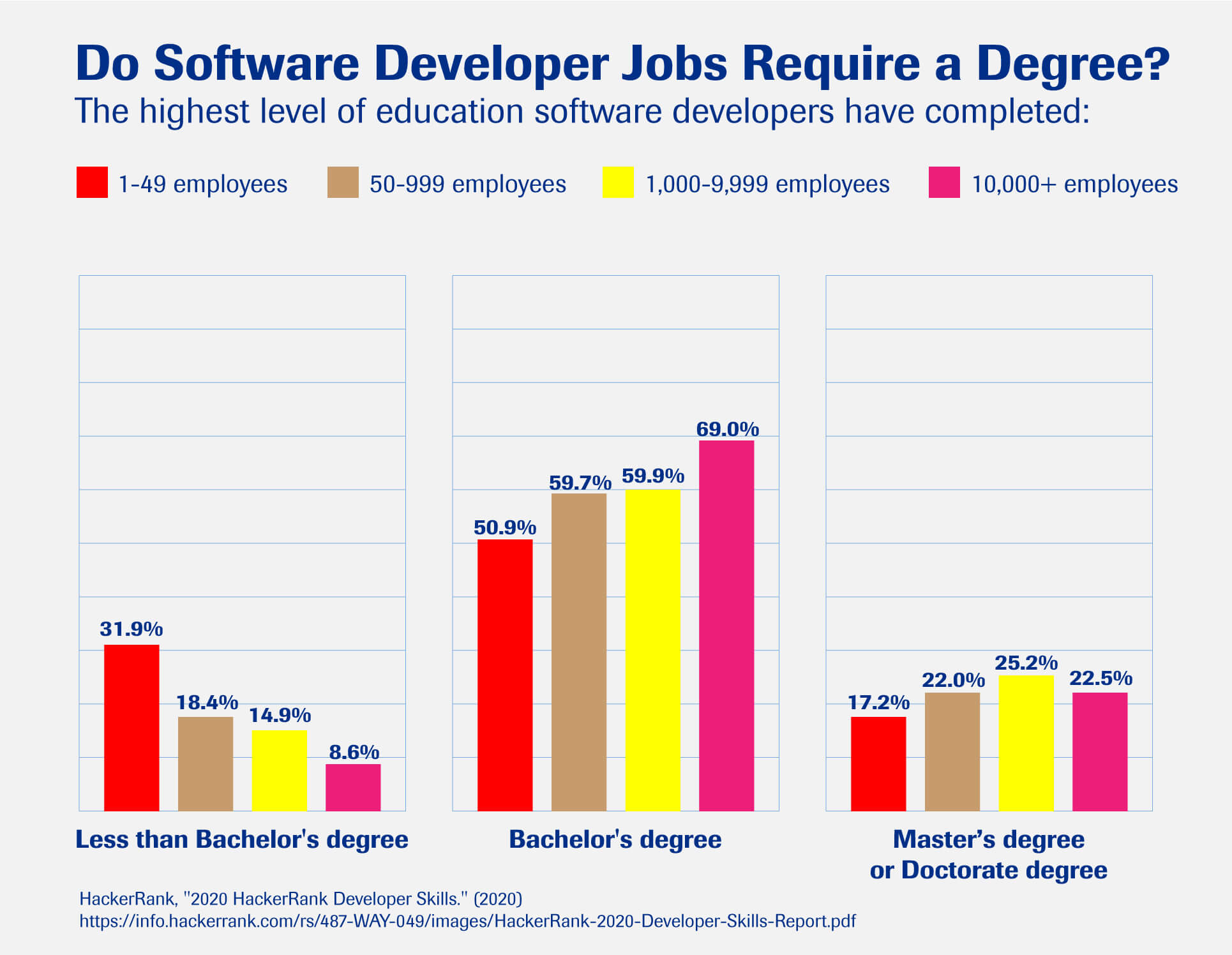Do You Really Need a Degree to Be a Software Engineer?

If you’re a bright learner with dreams of becoming a software engineer, you will likely be instructed to finish high school, apply to college, study for four years, graduate, and then (and only then) land your first job in the industry.
But what if life doesn’t happen to unfold that perfectly? What if you don’t have the time or resources to commit to four years of full-time study? What if you found your passion for software engineering after spending years in a completely unrelated field — or realized that the career you prepared for in college doesn’t excite you as much as programming does?
The stock educational path mandates that you go to college or give up on your dreams of being a developer. But do you really need a degree to be a software engineer?
In short — no.
Do You Need a Degree to Be a Software Engineer?
For all of the emphasis on the importance of a college degree, a conventional four-year educational route is not always necessary for success in the software development world. Practical, hands-on experience and skills in coding can be far more critical than merely holding a degree.
One writer for the job-search site Monster might have put the matter best by saying: “Look, college isn’t for everyone. The good news is that employers know this, and there are in-demand industries and jobs — especially in the red-hot tech sector — where the right combination of experience, aptitude and willingness to learn on the job can make that degree requirement fade away.”
He has a point. Today, many people in the industry forge their own path with little more than coding skills, hard work, and creativity. According to StackOverflow’s 2020 Developers Survey, only 9.7 percent of professional developers believe that a formal university education is “critically important” for success.
Taking an off-the-beaten-track path into software development won’t consign you to the low-paid, low-skilled jobs in the field, either. Today, there is a wealth of prestigious positions in the industry that skilled candidates can access without a college degree.
In the last several years, tech industry giants such as Google, Apple, and IBM have all revoked company policies that once required candidates to have four-year degrees in order to qualify for a role. These companies’ decisions sparked headlines — but they aren’t exactly groundbreaking.
After all, the tech industry is steeped in a culture that encourages self-made developers to explore new possibilities. Some of the most widely used coding projects today — including web content management systems like WordPress and Drupal — are open-source, with contributors of all backgrounds and levels of expertise producing code that can be used by millions of people worldwide.
So, do you need a degree to be a programmer? While there are always exceptions for individual employers, the answer is probably no. In the current professional climate, aspiring software developers don’t necessarily need a college degree in computer science to land a job — so long as they have the requisite skills and are prepared to put hard work and dedication into the job search.
Why Do So Many People Think You Need One?
For years, degrees have served as a form of assurance that a candidate has the skills, understanding, and knowledge to be capable of success in a software development job. Having a computer science degree from a university demonstrates that you have the mathematical background, theoretical understanding, and practical coding skills needed to achieve success in the field.
Put simply, employers know that if they hire a computer science graduate, their new employee probably has a sturdy set of fundamental industry skills.
Similarly, many aspiring developers know that getting a four-year degree, especially in computer science, is a great way to accumulate marketable skills, develop professional connections, access networking opportunities, and participate in internships and other portfolio-building projects.
Given all this, it’s not surprising that a college degree remains one of the most popular ways for aspiring professionals to enter the field. According to Stack Overflow’s 2020 Developers Survey, around 75 percent of professional developers have a bachelor’s degree or further education, such as a Master’s or Ph.D.
Computer science programs are burgeoning in size, too. In January 2019, the New York Times reported that “the surge in student demand for computer science courses is far outstripping the supply of professors, as the tech industry snaps up talent.”
The growing need for talent in the tech industry has driven employers to look outside their typical talent pools. According to a recent analysis from the software engineering service provider Ncube, there will be only 400,000 software developer graduates in the United States by 2021 — an impressive number, but not nearly enough to fill that 1.4 million developer shortage that will occur that same year.

Employers need staff, and they know it. That knowledge has driven them to look beyond traditional requirements in their quest for talented coders. Their flexibility poses an enormous opportunity to aspiring programmers today.
While a traditional four-year degree can be helpful for building skills, opening doors, and getting an interview, it is no longer necessary and probably won’t be making a comeback anytime soon.
Do Software Developer Jobs Require a Degree?
Do you need a degree to be a computer programmer? No, generally not — but how much your educational background matters might depend on where you apply.
Despite the public statements from companies like IBM and Google, smaller companies are still more likely to hire developers without a computer science degree than the largest tech firms.
According to HackerRank’s 2020 Developer Skills Report, 31.9 percent of developers at small companies (i.e., those employing between 1 and 50 employees) do not have a bachelor’s degree, compared to the 18.4 percent who say the same at mid-size businesses (between 50 and 999 employees), 14.9 percent at large companies (between 1,000 and 9,999 employees), and just 8.6 percent at massive organizations (over 10,000 employees).

That said, there are ways to invest in a formal, employer-respected education without graduating from a college program. The same HackerRank survey also found that 31.7 percent of hiring managers have hired successful learners from tech boot camps — short, intensive, skills-based courses that usually wrap up in three to six months. These alternative options require a fraction of the time and money that a traditional college program does, and can set an employer at ease just as well as a four-year degree.
According to HackerRank, 39.2 percent of hiring managers believe that individuals who complete a tech boot camp are “just as equipped for the job than other hires,” and 33 percent believe that they are “better equipped” to handle their professional responsibilities.
While boot camp courses typically don’t encompass the breadth of theoretical background that a four-year degree does, they do provide learners with marketable skills and often attract determined participants.
Hiring managers believe that unconventional educational experiences provide candidates with benefits that go far beyond education alone. Almost three-quarters of surveyed hiring managers said that boot camp learners are adaptable and are able to learn new technologies and languages quickly. Sixty-one percent cited their strong practical experience, and another 52 percent said that boot camp learners are often eager to take on new responsibilities and tasks.
While there may still be some jobs that require a college degree in computer science, there is no shortage of opportunities available to determined learners, especially if they target smaller firms for employment opportunities and invest in alternative learning pathways.
Degree Alternatives
Boot Camps
As mentioned previously, a coding boot camp is a great way to obtain new skills quickly and affordably. Boot camp courses can be full-time or part-time, and they tend to focus more on practical skills than on the theoretical underpinnings of programming.
Coding boot camps typically use project-based learning to teach widely-used programming languages or frameworks such as Python, Ruby on Rails, PHP, or JavaScript. Learners usually complete their coursework with a portfolio, a wealth of interview practice, and a roster of professional connections.
Given their utility, it’s not all that surprising that boot camps are growing in popularity. According to a 2019 study from Course Report, boot camp attendance rates have increased by 11 times since 2013; in 2019 alone, 22,043 learners completed coding boot camps.
These alternative options are especially popular among younger learners and established professionals who want to make a career change without investing in another four-year degree. HackerRank’s research indicates that nearly one in six polled Gen Z’ers has enrolled in a boot camp to learn new skills.
Of course, there are pros and cons to any educational path.
A coding boot camp is cheaper and faster than obtaining a computer science degree through a college curriculum. These courses are accessible and offer intensive, skills-based training that can give aspiring developers the knowledge they need to hit the ground running at work. A learner can complete a boot camp within three to six months, and the schedules are often flexible, with full-time, part-time, in-person, and virtual learning options available.
In the end, your choice to enroll in or forgo a boot camp program will be entirely up to you, your goals, and your available resources.
Additional Resources:
- Columbia Engineering Boot Camps — Want to know what a top-tier boot camp might offer? Check out the Columbia Engineering Boot Camps course list.
- How I Transitioned My Career into Tech with a Coding Boot Camp — One boot camp learner explains how six months of intensive study propelled her into a coding career.
Self-Directed Learning
Want a less structured and less expensive educational option? You’re in luck; there is a wealth of options and educational resources available online.
Some self-guided classes are free, and those that are not are still usually affordable. You can learn virtually and set your schedule. Online curricula are usually pre-built to guide learners through an orderly progression of concepts. Virtual courses often offer post-lesson activities and tests that you can take according to your own preferences and speed.
If you need flexibility but want an easy-to-follow educational curriculum, self-directed online classes may be a good route for you — provided that you can stay motivated and hold yourself accountable.
Of course, there are also cons to this educational approach, too. For one, you must be very disciplined and remain committed to your studies even without an instructor looking over your shoulder. It’s also crucial to research courses before you enroll. Not all online courses are created equal; some teachers and educational platforms are far better than others. Make sure to do your due diligence — read through participant reviews before embarking on an online course!
Additional Resources
- Coding Resources for Women at Every Stage of Their Career — Read our article on influential women in computer science and explore technical coding and community-based resources.
- Codecademy — Codecademy offers a wide range of online classes, combined with code-checking technology that tests your code immediately.
- Khan Academy — One of the original online course giants, Khan Academy offers a wide range of specialized coding classes online.
Books, Tutorials, and Podcasts
If you prefer to make your own cost-effective curriculum, you may want to teach yourself by independently studying books, tutorials, podcasts, and other low-cost resources.
The pros are obvious; this is a very inexpensive route, and you maintain total control over your learning pace and direction.
On the other hand, you hold the sole responsibility for making your own “curriculum.” Learners must be strongly self-motivated and take the time to develop a study plan if they hope to complete their education within a reasonable period.
An independent route does have one more significant drawback — unlike boot camps and online courses, independent learning does not offer any reassurance to employers that an individual possesses marketable skills. If you choose to learn independently, make sure that you have a robust portfolio to support you during interviews!
Additional Resources
- Code Complete: A Practical Handbook of Software Construction — This book by Steve McConnell is widely considered an excellent guide to computer programming. It has been fully updated and revised.
- Derek Banas’s YouTube Channel — Derek Banas makes detailed, learning-focused tutorials on a wide range of useful topics, including programming, web design, and mobile development.
- Coding Blocks Podcast — This podcast explores the world of coding with educational content geared toward learners and industry professionals alike.
- How to Become a Front End Developer in 2020 — Read our guide on the skills needed and educational paths available for becoming a front end developer.
- 9 Skills You Need to Become a Back End Developer in 2020 — Read our article on the essential skills you’ll need to learn if you want to become a back end developer.
Final Thoughts
The tech industry is the place to be. Demand for talented programmers is skyrocketing, opportunities are abundant — and now, barriers to entry are lower than ever.
Do you need a degree to be a coder? The answer is no. Explore online learning, resources, and our coding boot camp to find your path to programming success!

 Live Chat
Live Chat